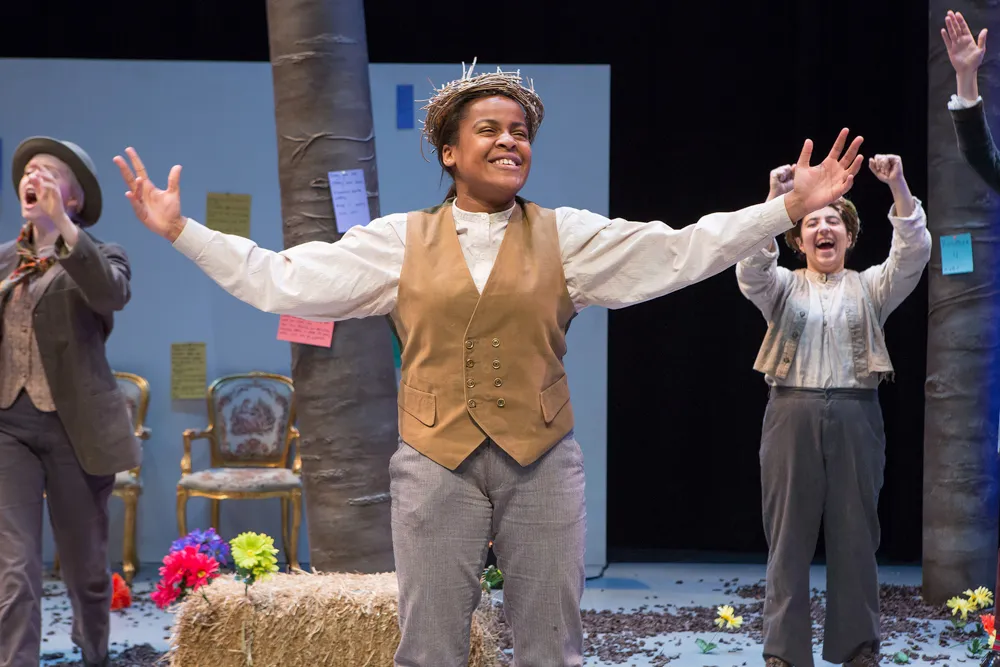Prospective Students

Photo by Steve Weinik
The Department
The Department of Theater believes in small-scale studio work as the proper expression of an undergraduate curriculum. The Frear Ensemble Theater in the Lang Performing Arts Center (LPAC) makes possible a wide variety of work in acting, directing, playwriting, and design. This variety is combined with an emphasis on collaboration as the primary theater-making experience. The LPAC provides a superb venue for distinguished guest artists to perform and teach on campus as well as for a wide variety of curricular and extracurricular student productions.
The Department of Theater today serves more than 200 students a year through an average of 23 courses and seminars. The Department has four full-time professors, serves an average of eight majors and minors in each graduating class, and has developed a dynamic Honors curriculum. Theater majors have regularly combined their studies with literature and the other arts programs on campus as well as with mathematics, computer science, engineering, political science, psychology, linguistics, education, and religion. The many students in our classes who are not theater majors come from all over the curriculum and, in turn, spread theater across the campus. It's important to us that these students not only attend the theater but also participate in the kinds and quality of experience necessary to create it.
Our students can fully engage each other, our faculty, master artists, other disciplines and cultures, and ultimately the world beyond Swarthmore.
The Department's typical "season" of performances consists of three bills of projects generated by our directing workshops, a faculty-directed production with advanced acting students, the senior company (a project collectively created by senior majors and minors), one or more honors thesis productions, and at least one major residency and performance by a distinguished visiting company. The overwhelming majority of this performance activity is for academic credit within rigorously structured laboratory courses with intensive involvement of faculty members as teachers, collaborators, and mentors. The laboratory nature of our courses in acting, scenography, directing, dramaturgy, and playwriting in principle parallels the work of our colleagues in foreign language, education, the natural sciences, and engineering as well as the other arts programs on campus.
Guest Artists Enrich Program
With the generous support of the William J. Cooper Foundation, the Department of Theater has hosted extended residencies and performances in LPAC by a roster of distinguished guest artists from the United States and abroad. Through teaching as well as performance work, the Department of Theater has joined with students and colleagues in a wide variety of ways across the College curriculum. In 2000, the department joined forces with Dance, Engineering, Environmental Studies, and the Foreign Study Office to launch the College's innovative new semester abroad program in Poland. Theater faculty and students have also been involved with a number of ongoing collaborations with professional theaters in the Philadelphia area and beyond.
Many of our majors and minors have taken up careers in theater, television, and film. The range of their activities inevitably both reflects and surpasses Swarthmore's theater curriculum and now extends to a number of foreign countries. Swarthmore theater graduates are regularly employed at leading theaters around the country as well as admitted to prestigious conservatory and doctoral programs. In the Philadelphia area, graduates of the department have established the critically acclaimed Pig Iron Theatre Company, which has toured extensively abroad and employed more than a dozen College alumni to date. Gail Lerner '92 was nominated for an Academy Award for Best Short Live Action Film in 2001. Quinn Bauriedel '94 recently became the first alumnus of the department invited back to teach. In keeping with our liberal arts mission, however, an equal number of graduates of the department have successfully gone on to careers in medicine, law, engineering, business, education, and public administration. The study and practice of theater has proven, in retrospect, to be an exemplary expression of the ideals of a liberal arts education.
New Relationships
The Department of Theater looks forward to contributing to the College's educational mission in the future in ways both familiar and new. We see ourselves as an educational and artistic laboratory, a place for testing the talents of our students and faculty alike. More broadly, we are here to test new practices for a rigorous liberal arts education as well as for the historic and contemporary practices of performance. Our mission extends to the development of new collaborative models between the academy and the professional theater, and the building of new bridges between the American theater and the rest of the world. The synergistic and collaborative nature of theater as an art inevitably makes our work interdisciplinary, cross-cultural, and socially engaged. Our emphasis on collaboration, ensemble, and collective creation parallels the traditional Quaker values of decision making by consensus and nonhierarchical organization. The nature of our work as performance permits us the opportunity to share the results of our research with the campus community as a whole. Our department has enjoyed its greatest success when functioning as a crossroads, where our students can fully engage each other, our faculty, master artists, other disciplines and cultures, and ultimately the world beyond Swarthmore-while simultaneously nourishing each student's individual talents and aspirations.
The department works both to honor and expand Swarthmore's traditions, to be a visible expression of the College's values both on campus and in the world, and to enrich our community with new relationships and understandings best made-and at times only possible-through the practice of the performing arts.



